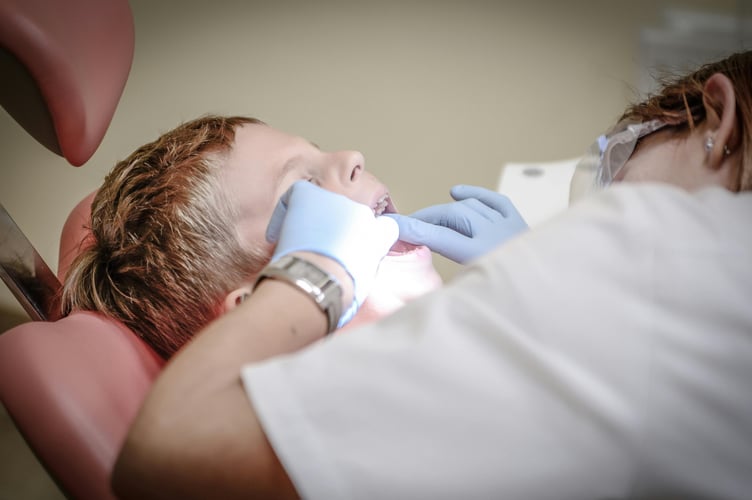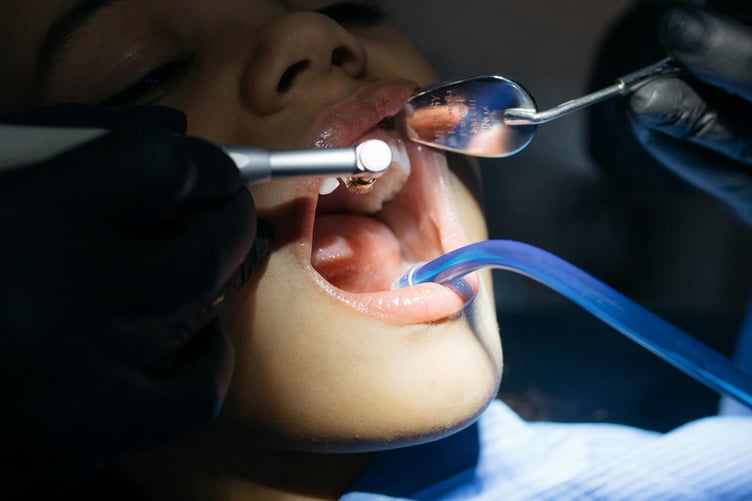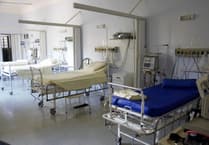It’s a two-hour drive on a good day from Aberystwyth to Pembroke. But it wasn’t a good day for Rob Morgan. His seven-year-old daughter had tooth pain and a hole in her tooth.
He called the NHS help line for assistance, and was told to drive to a clinic in Pembroke.
“All they did was to do an x-ray and put in a referral to a dentist and this apparently could take up to seven months for any treatment. Having spoken to the dental line again, her options are likely to be Haverfordwest or Cardiff.”
It’s a similar story all across west Wales and in the Hywel Dda health board area.
Darren Turner, a 48-year-old chef from Talyllyn, waited more than 15 months for a root canal due to multiple cancelled appointments. He had an emergency appointment with his NHS dentist Eirlys Dental Practice in Dolgellau for severe tooth ache and given antibiotics. Two months later, in January 2024 at a check-up he was told he needed a root canal.
He did not have the procedure until March 2025 due to six cancelled appointments.
The delay lead to him suffering from multiple infections in the problem tooth. They never gave him a reason for the cancellations, but it is indicative of an overstretched system without enough NHS staff to cover unexpected absences and leave.
"The tooth was super sensitive after the initial infection so I had to try keep food and drink away from it. It then got infected four times - it was pure agony,” Mr Turner said.
According to the British Dental Association, the future of public dental care is at risk, and a ‘shocking’ survey from the groups offers little in the way of hope that things might get better.
Key findings from the survey include:
● 88 per cent of respondents do not currently have an NHS dentist.
● 60 per cent had attempted to register but were told no places were available.
● Over one-third of people reported not seeing any dentist at all.
● NHS care is often limited to emergency-only services, with many patients receiving only temporary relief.
● Travel barriers, long delays, and high costs are significant deterrents - especially for children, the elderly, and low-income households.
Testimonials from constituents in Mid and South Pembrokeshire told their Labour MP Henry highlight a system under strain:
● One resident reported waiting 16 years for an NHS dentist.
● A parent paid £2,000 out of pocket for their 19-year-old son's dental care.
● Another individual developed jaw cancer, citing delays in treatment as a contributing factor.
Mr Tufnell remarked: “Patients are frustrated with the service they’re receiving from Hywel Dda University Health Board. Our local dentists and dental nurses are working incredibly hard, but ultimately the Health Board manages the NHS dentistry contract.
“The current system is failing to meet the needs of my constituents in Pembrokeshire, and this data raises serious questions about its long-term sustainability. As their MP, it’s my duty to hold HDUHB to account and continue pushing for real improvements in the delivery of health services.
“Patients are suffering, and services are falling short.
Mr Tufnell added: “The barriers preventing people from accessing treatment are causing, in some cases, devastating consequences - soaring dental bills, deteriorating health from delayed care, and families locked out of a system through no fault of their own.
“I will continue to work directly with Professor Phillip Kloer and the Dentistry Services team to secure concrete improvements for patients across my constituency.
“I am confident that there is a way forward to significantly improve delivery, and now over the coming weeks I will be working with local dentists and continuing to work constructively with Hywel Dda Health Board to tackle this serious issue.”
According to the BDA, only 2 per cent of dentists responding feel that changes would support the long-term sustainability of NHS dentistry in Wales.
Just 2 per cent agree that reforms would improve population health, with only 5 per cent saying that they would enhance prevention. Two per cent feel reforms would support continuity of care, with the same proportion believing it would enhance early detection of oral health conditions, 8 per cent say that reforms would actually improve access to NHS care.
A mere 6 per cent think the proposed system would provide good value for money for the taxpayer.
Dentists have been left in an invidious position, that risks an exodus from the NHS. According to the BDA, 42 per cent would be unwilling to go back to working under the historic discredited system of targets going forward, while 72 per cent would not be willing to work under the proposed reforms as they stand.
The survey found 73 per cent of dentists say they are likely to reduce their NHS commitment in the event the model is imposed next year, and almost two-thirds say they are likely to go fully private.

Changes are expected to be fast-tracked for rollout next year with limited scrutiny in the Senedd. The Welsh Government has resisted calls for piloting, despite Jeremy Miles, the Cabinet Secretary for Health and Social Care, describing the package as the "biggest change in nearly 20 years."
Despite a headline focus on prevention there are only tokenistic measures to expand fluoride varnish application. The shift to move healthier patients to appointments of up to 24 months apart is likely to limit the scope to act on the early signs of disease, including oral cancers, and stymie opportunities for preventive advice and treatment.
The removal of patients from practice lists to a centralised database where they would be allocated to different practices on a first come first served basis would likely escalate this, undermining continuity of care, and spelling the end of the ‘family dentist’, with parents and children at risk of being split up and allocated to different providers.
The changes would also see the Community Dental Services, who currently treat groups such as people with special needs and learning disabilities, take responsibility for the highest needs patients, with no clarity on whether they will receive any extra resource to do so. Failure to appropriately fund the CDS to take on this additional workload would come at the expense of the most vulnerable patients in society.
The system would bring radical changes to the way dentists are paid, with rewards for delivering a ‘care package’ to patients with ongoing or complex needs. The proposed level of payment fails to reflect the true cost of care, and risks leaving NHS providers delivering care at a loss. The Westminster Government is currently undertaking an exercise to measure the surging costs NHS dentists now face, but no such work has been undertaken in Wales.
The BDA has also lambasted the Welsh Government for its seeming unwillingness to meaningfully engage with the public on reforms that would change the face of dental care in Wales.
Russell Gidney, Chair of the BDA’s Welsh General Dental Practice Committee, said: “On improving access and outcomes and refocusing on prevention, the Welsh Government set lofty goals, but its reforms risk achieving the exact opposite.
“Now dentists are stuck between the devil and the deep blue sea, between a failed status quo and an unpopular, untested alternative.
“Common sense must prevail. Ministers must be willing to listen, pilot plans and avoid a leap in the dark that could destroy this service.”
That’s little comfort for Sue Swindells from Aberystwyth.
“I have now got two teeth that need attention,” she says. “One has a temporary filling done privately at extortionate cost and where I felt they just wanted me to pay for unnecessary treatment. I was very uncomfortable and won’t go back. I have now approached another dentist as I have a broken tooth on the other side. They come recommended and I’m waiting for an appointment but dreading the bill. NHS dentistry in Ceredigion is non-existent and the private costs are beyond the reach of the majority. The situation is a disgrace.”
Dwyfor Meirionnydd MS and Plaid Cymru spokesperson for Health and Social Care, Mabon Gwynfor MS said: “These proposed changes by the Labour Welsh Government do nothing to address the issues with the current contracts and could push more NHS dentists to the private sector by asking them to do more with less.

"Not only will patients lose their family dentist, but there's no focus on preventative oral needs, and it will result in less access to regular dental care - only cementing the three-tier dental system where few people are able to access NHS dentistry, while others are forced to seek private treatment or take matters into their own hands.
“NHS dentistry in Wales is facing an existential crisis - and Labour must head these warnings from the sector. Plaid Cymru have called for minimum NHS dental staffing levels to match service provision with demand - with the Senedd passing this proposal, it is incumbent on Welsh Government undertake this work. Plaid Cymru would also ensure access to dentists at schools. We're clear that NHS dentistry isn’t a ‘nice to have’ or an optional extra, but something that everyone has a right to access."
Conservative Senedd Member for Carmarthen West and South Pembrokeshire Samuel Kurtz has voiced strong concerns over the Welsh Government’s latest approach to NHS dentistry, warning it could further jeopardise access to vital dental care for millions in Wales.
Mr Kurtz highlighted the scale of the problem, calling it “one of the top issues” raised by constituents.
“The system is failing. Patients are left in pain, dentists are overwhelmed, and public trust in NHS dentistry is eroding all while the Welsh Labour Government is sitting back and watching this crisis unfold,” he said.
“With more dentists handing back NHS contracts, it’s clear the current system isn’t working. This latest move risks being the final blow to NHS dentistry in Wales.
“The Welsh Government must work with, not against, dentists to deliver meaningful reform, tackle patient backlogs, and ensure that access to dental care improves – not deteriorates further.”
Jane Dodds, the Lib Dem Leader and MS for mid Wales, says NHS dentistry in Wales “is on life support”.
“This report lays bare what the Welsh Liberal Democrats has been saying for a long time: NHS dentistry in Wales is on life support,” she said.
“For too long, dentistry has been treated as an afterthought by the Welsh Government – a burden it seems increasingly willing to offload onto the private sector.
“[As a result], we are witnessing a growing number of dentists leaving the NHS, creating a crisis in access to affordable dental care.
If we are serious about protecting people’s dental health, then urgent investment is needed to stabilise and strengthen NHS dentistry.
“That’s why we have put forward a detailed and fully costed plan to save NHS dentistry in Wales – a plan designed to ensure that everyone, regardless of income or postcode, can access the dental services they need when they need them.”
According to Ms Dodds, the Lib-Dems will Increase per-capita spending from the current £47 to match the levels of Scotland (£55) and Northern Ireland (£57).
The party says it will set targets for health boards in terms of numbers of, and waiting times for, appointments, empowering them to use salaried staff to achieve those targets as well as entering into agreements with private sector providers.
“We will set up a national waiting list system, properly resourced and working with health boards, to ensure that the process of getting an appointment is more efficient, and that fewer appointments are lost,” she says.





Comments
This article has no comments yet. Be the first to leave a comment.